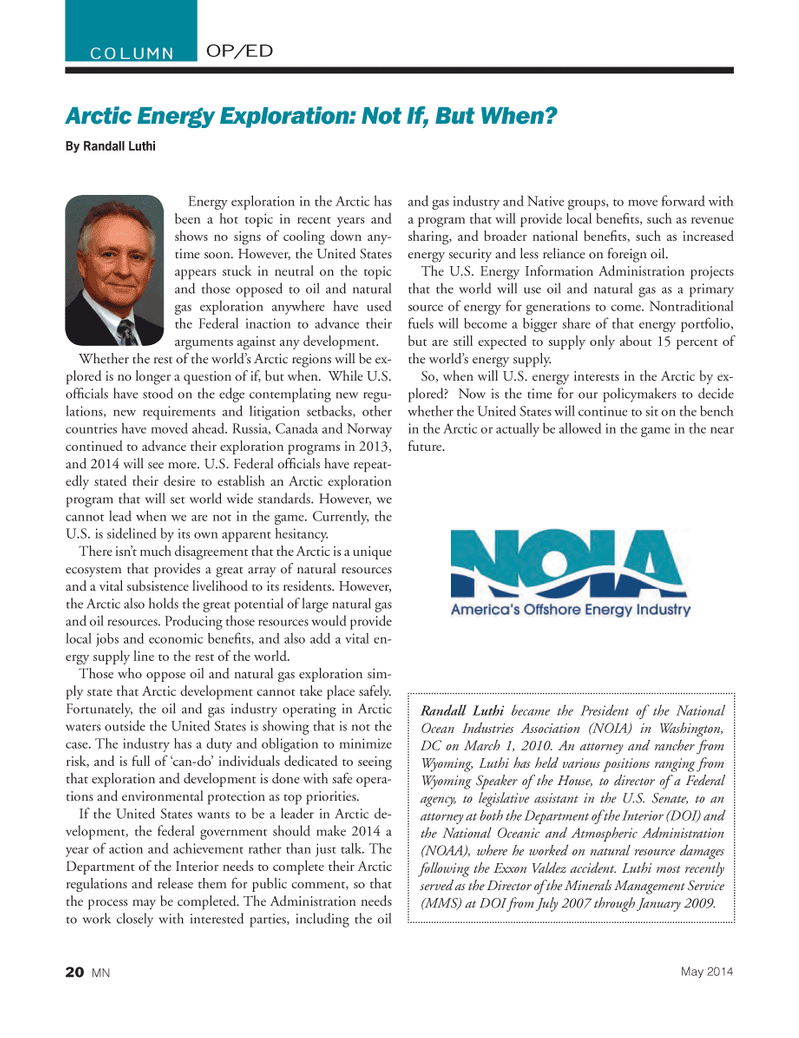
Page 20: of Marine News Magazine (May 2014)
Offshore Annual
Read this page in Pdf, Flash or Html5 edition of May 2014 Marine News Magazine
Energy exploration in the Arctic has been a hot topic in recent years and shows no signs of cooling down any- time soon. However, the United States appears stuck in neutral on the topic and those opposed to oil and natural gas exploration anywhere have used the Federal inaction to advance their arguments against any development.
Whether the rest of the world’s Arctic regions will be ex- plored is no longer a question of if, but when. While U.S. offi cials have stood on the edge contemplating new regu- lations, new requirements and litigation setbacks, other countries have moved ahead. Russia, Canada and Norway continued to advance their exploration programs in 2013, and 2014 will see more. U.S. Federal offi cials have repeat- edly stated their desire to establish an Arctic exploration program that will set world wide standards. However, we cannot lead when we are not in the game. Currently, the
U.S. is sidelined by its own apparent hesitancy.
There isn’t much disagreement that the Arctic is a unique ecosystem that provides a great array of natural resources and a vital subsistence livelihood to its residents. However, the Arctic also holds the great potential of large natural gas and oil resources. Producing those resources would provide local jobs and economic benefi ts, and also add a vital en- ergy supply line to the rest of the world.
Those who oppose oil and natural gas exploration sim- ply state that Arctic development cannot take place safely.
Fortunately, the oil and gas industry operating in Arctic waters outside the United States is showing that is not the case. The industry has a duty and obligation to minimize risk, and is full of ‘can-do’ individuals dedicated to seeing that exploration and development is done with safe opera- tions and environmental protection as top priorities.
If the United States wants to be a leader in Arctic de- velopment, the federal government should make 2014 a year of action and achievement rather than just talk. The
Department of the Interior needs to complete their Arctic regulations and release them for public comment, so that the process may be completed. The Administration needs to work closely with interested parties, including the oil and gas industry and Native groups, to move forward with a program that will provide local benefi ts, such as revenue sharing, and broader national benefi ts, such as increased energy security and less reliance on foreign oil.
The U.S. Energy Information Administration projects that the world will use oil and natural gas as a primary source of energy for generations to come. Nontraditional fuels will become a bigger share of that energy portfolio, but are still expected to supply only about 15 percent of the world’s energy supply.
So, when will U.S. energy interests in the Arctic by ex- plored? Now is the time for our policymakers to decide whether the United States will continue to sit on the bench in the Arctic or actually be allowed in the game in the near future.
OP/ED
COLUMN
Arctic Energy Exploration: Not If, But When?
By Randall Luthi
Randall Luthi became the President of the National
Ocean Industries Association (NOIA) in Washington,
DC on March 1, 2010. An attorney and rancher from
Wyoming, Luthi has held various positions ranging from
Wyoming Speaker of the House, to director of a Federal agency, to legislative assistant in the U.S. Senate, to an attorney at both the Department of the Interior (DOI) and the National Oceanic and Atmospheric Administration (NOAA), where he worked on natural resource damages following the Exxon Valdez accident. Luthi most recently served as the Director of the Minerals Management Service (MMS) at DOI from July 2007 through January 2009.
May 2014 20 MN
MN May14 Layout 18-31.indd 20 4/21/2014 10:35:16 AM

 19
19

 21
21
